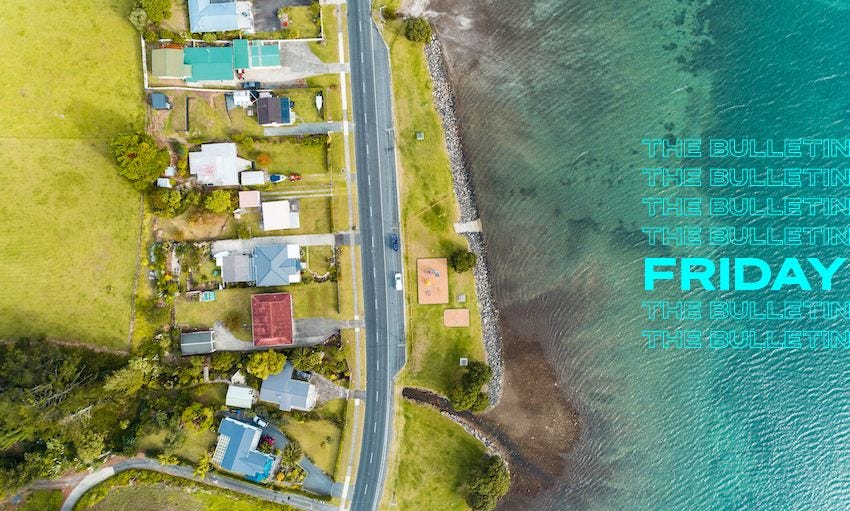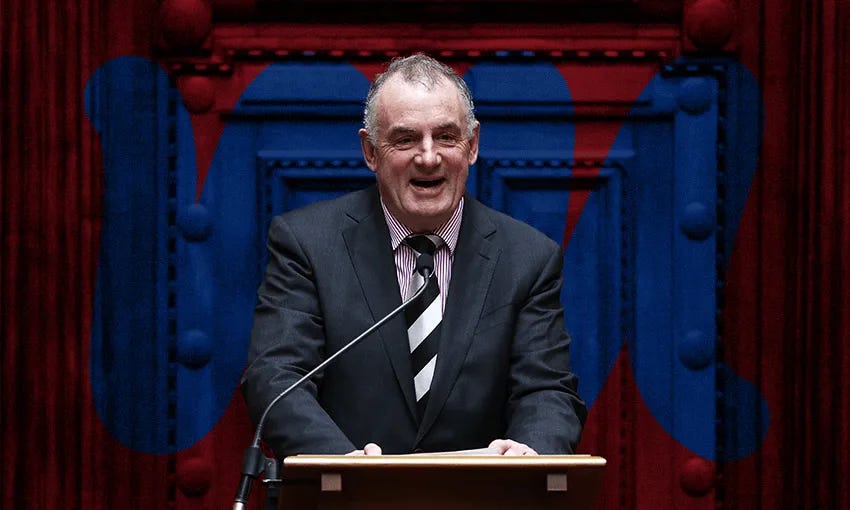Who can afford to care about adapting to climate change?
New research about the fairness of insurance cost hikes for houses in areas adversely impacted by climate change shows a difference of opinion between homeowners and renters.
In today’s edition: understaffing in early childhood centres; freedom campers targeted in new legislation; where the blame lies for high house prices but first, fairness and the cost of climate change.
Homes on parts of New Zealand’s coast will begin losing access to affordable insurance within 10 years
New research shows gap between renters and homeowners on fairness of insurance hikes
I get mad at least once a week about my inability to use public transport to get to and from work. From where I live, it would be a multi-modal two to two and half hour commute back and forth. It’s a 23 minute drive one way, off peak. I live where I live because it was what was affordable at the time. The further out we went, the worse the public transport options got but the houses were cheaper. My own situation underscores the relationship between housing affordability and climate change action. New research from Anthem and Talbot Mills shows that homeowners were much more likely than renters to consider it fair for insurance premiums for properties in flood-prone areas to be rising faster.
Cost of flooding to homes to increase by 20%
The research was done to highlight the importance of fairness and reputation for companies like banks and insurance companies. Half of New Zealanders believe it is fair for insurance premiums for properties in flood-prone areas to rise but there’s an attitudinal gap between renters and homeowners, and younger people and older people. Younger people thought insurance premium hikes in flood-prone areas were unfair. The average annual cost of river flooding to residential buildings could increase by more than 20% by 2050, and 30% by 2100.
It will be harder to get a home loan
A majority of people of Kiwis think it is fair for banks to pull back lending for mortgages in high flood-risk locations, but again, a big gap appears between homeowners and renters in whether they regard that as fair. I read this as an indictment of house prices, rather than the attitudes of young people and renters about climate change. If you don’t already own a house, it’s going to get harder and more expensive because of our need to adapt to climate change. Insurers are already pricing flood risk into insurance premiums. New Zealand is going to mandate climate risk disclosures for companies from 2023. That will include banks.
The suburb where Costco was built
I swear this isn’t a false cover to wrangle Costco into the Bulletin but as it’s topical (the prime minister visited the store yesterday, sneak peak below), it provides a handy lead into a great story from the Herald’s Ben Leahy (paywalled) over the weekend. Leahy has profiled the suburb where the new Costco has been built. Westgate in Auckland’s north-west is booming and you can buy a two-bedroom, 79m2 home for $769,000, well below the average price for a home in Auckland. The cost of servicing a home loan is rising and you can see the appeal of Westgate to younger people, but the area also suffers from a lack of public transport putting younger people in the position of having to make trade-offs. It’s a great example of why younger people might hold a different view on the fairness of bearing the costs of adapting to climate change.
What’s the shape of your future? Created by our friends at Stuff, NowNext is a survey designed to better understand how younger New Zealanders feel about where Aotearoa is going. The survey looks at everything from our employment market and financial literacy to health, travel and the climate. It should only take about five minutes, and everyone who takes part will go in the draw to win one of 20 $100 Prezzy Cards. Learn more and get started here.
Staffing levels at early childhood centres are inadequate
New research commissioned on behalf of New Zealand's largest education union, NZEI Te Riu Roa, has found minimum early childhood centres staffing levels are causing burnout and stress for those working in them. The government currently requires that there be one teacher for every five children under two years of age. For two-year-olds and over, the minimum ratio is one teacher to every 10 children. The research has found that in those centres that just meet the minimum requirements, staff are burnt out, stressed and twice as likely to be subjected to physical violence. The union is calling for a review of the minimum staffing levels saying current levels are inadequate.
New bill takes aim at freedom campers
Introduced by tourism minister Stuart Nash, a new bill proposes that vehicle-based freedom campers need to have a certified self-contained vehicle to stay overnight on council-managed land. To be certified as self-contained a vehicle must have a toilet. The bill heeds the call of the Responsible Campers Association Inc (RCAI) who asked the government to address the issue ahead of visitors returning to New Zealand. The New Zealand Motor Caravan Association says the RCAI's view is "incredibly damaging” and that it undermines progress made to raise the standards of freedom campers, and their toilets.
The Spinoff Members is a community dedicated to supporting our work. You've heard from a few of our members this month on what inspired them to join.
Whatever it is about The Spinoff that you value most, know that every dollar donated will go towards making that happen and ensuring The Spinoff remains free to all. Join now.
Thanks to Jodi, Ian, Ben and Aaron for their kind words and to all our members for their continued support – we wouldn’t be here without you.
The finger of blame for house prices is turning
The ‘official’ economists in Wellington went hunting for the true culprit behind Aotearoa’s house prices and rents being the most expensive in the world, but perhaps the biggest culprit is the Government itself. With Wellington gaslighting the councils, now the finger of blame may be turning back in its direction. In this week's episode of When the Facts Change, Bernard Hickey talks to Hamilton Mayor Paula Southgate about the funding infrastructure and challenges, as well as why not enough land was opened up, to then be sold.
Click and collect
There are reports coming in this morning of an explosion on Auckland’s waterfront.
Cheaper airfares on the way as competition heats up.
The Speaker of the House apologises to Winston Peters.
Communities still isolated in Marlborough after flooding.
Hosts of far-right media outlet Counterspin reportedly arrested and charged.
Got some feedback about The Bulletin, or anything in the news? Get in touch with me at thebulletin@thespinoff.co.nz.
If you liked what you read today, share The Bulletin with friends, family and colleagues.
Trevor Mallard, a near constant presence in parliament for nearly 40 years, retired earlier this week. Ben Thomas looks back at the two sides of the Labour stalwart. Stewart Sowman-Lund and the prime minister (plus a few other hangers-on) check out New Zealand's first Costco. Bernard Hickey says that unless you have to sell right now, your fears about negative equity are probably overblown. Henry Cooke says politicians owe it to us to write more books. Tara Ward introduces the 10 great Kiwi bakers on the new season of The Great Kiwi Bake Off. Sam Brooks celebrates the 25th anniversary of an unlikely gaming hit: GoldenEye on the Nintendo 64.
The GOAT debate is baaaaad for sport
Despite my horrible pun in the headline, GOAT in this instance is not a reference to the animal. It's an acronym for “Greatest of all time” and is frequently deployed when discussing sportspeople. To be a GOAT you must not only be the best in your field and the best of your era but better than anyone else from the past and the future. This is where it starts sounding very stupid and the Guardian’s Tim Joyce argues that it is a “tiresome, simplistic and one-dimensional approach to assessing greatness”.
It’s Friday so…
Look, this is very sappy but as it’s usually me who's crying when my dogs eat our furniture, it was lovely to find out that dogs (maybe) cry tears of joy when their owners come home. I am simply choosing to ignore the scientists who are sceptical of the most joyful news this week.









